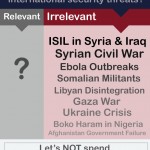You might not have noticed, but the U.S.’ plans to replace our aging nuclear weapons triad have been in the news a lot lately. Folks are understandably confused by the juxtaposition of the exorbitant price tag attached to current plans to upgrade all three legs of the triad at once, and the waning U.S. budget. The issue has prompted a demand for Obama to explain his shift from the inspiring Prague speech in 2009 to a long list of expensive nuclear modernization plans.
And some major voices have gotten into the mix. Defense One published an article from the Council on Foreign Relations recently that offers a summary of the current modernization plans, the debate surrounding them, and the emerging solution suggested by a growing number of nonproliferation advocates.
Some key points:
• Current plan could cost up to $1 trillion in the next three decades.
• Deterrence does not require a constantly growing arsenal.
• Unfortunately all three legs (Air, Land and Sea) are planned for modernization around the same time.
• The Ohio-Class submarine replacement program is expected to soar to over 50% of the Navy’s total budget in the coming 30 years, edging out other programs.
• The Air Force foresaw the probable consequence of replacing the Minuteman III Inter Continental Ballistic Missile (ICBM) and opted to use existing technology to modernize the current fleet instead.
• There are a growing number of calls from within and outside the government for a re-assessed plan that takes current budget constraints into account.
• This is a window of opportunity for President Obama to redirect our nuclear spending.
More details
Feeling the pressure, the White House is reviewing the current approach. The plan below claims to reduce spending while maintaining the existing defense structure (previous suggestions included the elimination of one of the three legs).
The chart below summarizes the article’s discussion including the systems slated for modernization, the estimated year of retirement, the current plan, estimated cost, and the proposed solution.

(Based on Defense One/ CFR article)
The above chart doesn’t include many of the other areas “up for modernization” including: nuclear warhead life-extension programs; the production of a warhead that would work for both land and sea-based ballistic missiles; and upgrading Energy and Defense Department systems that all add to growing costs.
While it seems difficult to implement change, the article highlights this information as a pivotal opportunity for the Obama administration. Making a responsible adjustment to current plans would allow the President to maintain the current structure, save money, and leave office with the legacy of moving towards a reduction in our reliance on nuclear weapons.
With important nonproliferation conferences ahead, including the 2015 Review Conference of the Nonproliferation Treaty in New York, these decisions hold extra weight; if my NPT simulation course at the Monterey Institute taught me anything, it’s that U.S. nonproliferation actions (positive or negative) will drive the direction of negotiations.


